In today’s rapidly evolving software development landscape, delivering high-quality applications is no longer optional, it’s essential for business success. With accelerated development cycles and increasing complexity, software testing teams need powerful tools to organize, execute, and track their testing efforts efficiently. Test case management software has emerged as a critical solution for quality assurance teams looking to streamline their testing processes and deliver bug-free software on time.
At ideyaLabs, we’ve helped numerous organizations transform their testing processes through innovative solutions that enhance efficiency and quality. In this comprehensive guide, we’ll explore everything you need to know about test case management software and how it can revolutionize your testing strategy.
What is Test Case Management Software?
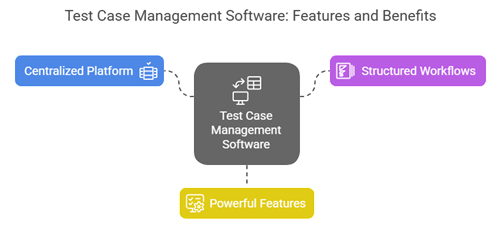
Test case management software provides a centralized platform for creating, organizing, executing, and tracking test cases throughout the software development lifecycle. Unlike manual methods such as spreadsheets or disconnected documents, dedicated test case management tools offer structured workflows and powerful features designed specifically for quality assurance activities.
These specialized platforms serve as a single source of truth for all testing activities, enabling teams to:
- Create and store test cases in organized repositories
- Plan and schedule test execution cycles
- Track testing progress and results in real-time
- Generate comprehensive reports for stakeholders
- Maintain traceability between requirements and test cases
- Collaborate effectively across distributed teams
Why Your Organization Needs Test Case Management Software
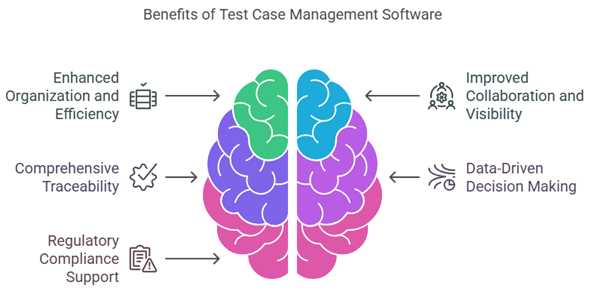
The traditional approach of managing test cases through spreadsheets or disconnected documents simply cannot scale to meet modern development demands. Here’s why implementing a dedicated test case management solution is crucial:
Enhanced Organization and Efficiency
Test case management software provides structured repositories for storing, categorizing, and managing test cases. This organization eliminates the chaos of scattered files and ensures that test cases are easily accessible when needed. Teams can create reusable test case libraries, saving significant time when testing similar features across different projects.
Improved Collaboration and Visibility
One of the most significant advantages of test case management tools is the enhanced collaboration they enable. Team members can work together on test case creation, review, and execution regardless of their physical location. Real-time updates ensure everyone has visibility into testing progress, eliminating communication gaps and preventing duplicate efforts.
Comprehensive Traceability
Effective test case management software establishes clear connections between requirements, test cases, and defects. This traceability ensures that all requirements are properly tested and makes it easier to understand the impact of changes. When defects are discovered, teams can quickly identify which requirements are affected and prioritize fixes accordingly.
Data-Driven Decision Making
Modern test management tools provide powerful analytics and reporting capabilities that transform raw testing data into actionable insights. Stakeholders can track key metrics such as test coverage, pass/fail rates, and defect trends to make informed decisions about release readiness. These insights also help identify bottlenecks in the testing process, enabling continuous improvement.
Regulatory Compliance Support
For organizations in regulated industries such as healthcare, finance, or aerospace, test case management software provides the documentation and audit trails necessary for compliance. These tools maintain detailed records of all testing activities, making it easier to demonstrate due diligence during regulatory inspections.
Essential Features to Look for in Test Case Management Software
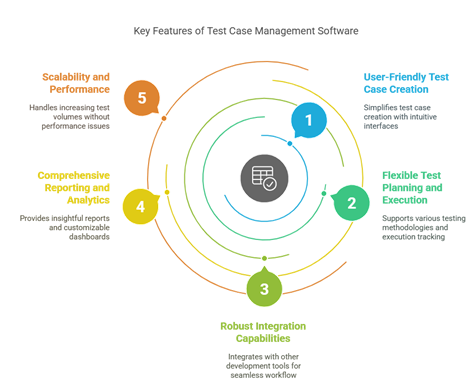
Not all test case management solutions are created equal. When evaluating options for your organization, consider these critical features:
User-Friendly Test Case Creation
The best test management tools make it easy to create, organize, and maintain test cases through intuitive interfaces. Look for features like templates, bulk operations, and drag-and-drop functionality that simplify the test creation process and reduce the learning curve for new team members.
Flexible Test Planning and Execution
Your test management solution should support various testing methodologies, from traditional waterfall to agile and DevOps approaches. It should allow teams to create test plans, schedule test runs, assign testers, and track execution progress all within a single platform.
Robust Integration Capabilities
Modern software development relies on an ecosystem of specialized tools. Effective test case management software should integrate seamlessly with other tools in your technology stack, including:
- Issue tracking systems (JIRA, Azure DevOps)
- CI/CD pipelines (Jenkins, TeamCity)
- Automation frameworks (Selenium, Cypress)
- Requirements management tools
- Source code repositories (GitHub, GitLab)
These integrations create a unified workflow that eliminates manual handoffs and ensures information flows smoothly across the development lifecycle.
Comprehensive Reporting and Analytics
Look for test management tools that provide insightful reports and dashboards that help stakeholders understand testing progress and quality metrics briefly. The ability to customize reports for different audiences—from technical testers to executive stakeholders—is particularly valuable.
Scalability and Performance
As your testing needs grow, your test case management solution should scale accordingly. It should handle increasing volumes of test cases, users, and projects without performance degradation, ensuring a smooth experience even for large enterprise deployments.
Common Challenges in Test Case Management and How to Overcome Them
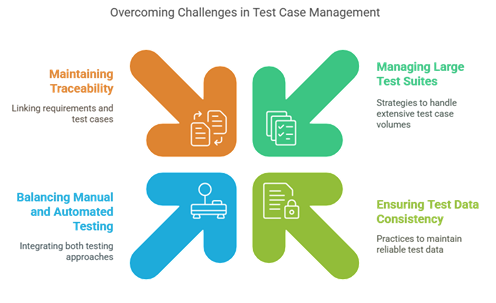
While test case management software offers tremendous benefits, organizations may face challenges during implementation and adoption. Here’s how to address common obstacles:
Managing Large Test Suites
As applications grow more complex, test suites can become unwieldy. To manage large volumes of test cases effectively:
- Implement modular test case design
- Establish clear naming conventions and categorization
- Regularly review and remove obsolete test cases
- Use automation for repetitive test scenarios
Ensuring Test Data Consistency
Reliable test execution depends on consistent test data. Implement robust test data management practices by:
- Creating dedicated test data sets
- Establishing data refresh mechanisms
- Considering test data management tools that integrate with your test case management solution
- Documenting data dependencies for each test case
Balancing Manual and Automated Testing
A comprehensive testing strategy includes both manual and automated tests. Modern test case management tools should support this hybrid approach by:
- Providing frameworks for both manual and automated test execution
- Offering visibility into automation coverage
- Enabling smart allocation of testing resources
- Producing unified reports across all testing types
Maintaining Traceability as Requirements Change
Requirements evolve throughout the development lifecycle, making it challenging to maintain traceability. Address this by:
- Implementing bidirectional links between requirements and test cases
- Establishing change management processes
- Using tools with impact analysis capabilities
- Regularly reviewing and updating test cases to reflect requirement changes
How ideyaLabs Enhances Test Case Management Through Automation
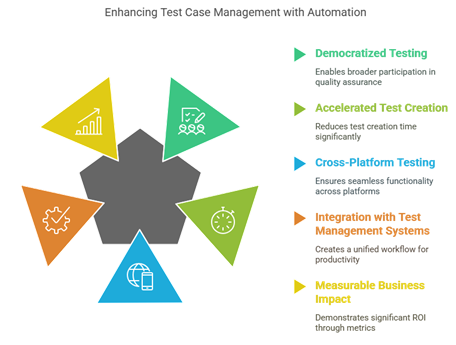
At ideyaLabs, we recognize that effective test case management goes together with powerful test automation. Our innovative no-code test automation solutions complement and enhance test case management processes in several keyways:
Democratized Testing Through No-Code Approaches
Our no-code test automation platform enables all team members—regardless of technical expertise—to contribute to the testing process. This democratization of testing leads to:
- Broader participation in quality assurance activities
- Reduced dependency on specialized programming resources
- Empowerment of business analysts and domain experts to contribute directly
- More comprehensive test coverage across all aspects of applications
Accelerated Test Creation and Execution
Traditional test case creation and execution can be time-consuming. ideyaLabs’ visual test creation tools dramatically accelerate these processes by:
- Reducing test creation time from hours to minutes
- Providing intuitive drag-and-drop interfaces
- Offering record-and-playback functionality for quick test development
- Enabling visual test flow mapping for complex scenarios
Enhanced Cross-Platform Testing
Modern applications must function seamlessly across multiple platforms and environments. Our solutions support comprehensive test coverage across:
- Web applications
- Mobile apps
- API testing
- Multiple browsers and devices
Powerful Integration with Test Management Systems
Our no-code automation platform integrates seamlessly with leading test case management tools, creating a unified workflow that enhances productivity and visibility. This integration provides:
- Automatic synchronization of test cases
- Consolidated reporting across manual and automated tests
- End-to-end traceability from requirements to automated test results
- Streamlined defect management
Measurable Business Impact
Organizations implementing ideyaLabs solutions alongside robust test case management typically experience:
- 60% reduction in testing time
- 40% decrease in testing costs
- 70% improvement in test coverage
- 50% faster time-to-market
These metrics demonstrate the significant ROI that can be achieved through the combination of effective test case management and innovative automation approaches.
Best Practices for Implementing Test Case Management Software

Successfully implementing test case management software requires careful planning and execution. Here are the key best practices to ensure a smooth transition:
Start with Clear Objectives
Define what you want to achieve with your test case management tool. Whether it’s improving test coverage, accelerating testing cycles, or enhancing collaboration, clear objectives will guide your implementation and help measure success.
Secure Stakeholder Buy-In
Ensure all stakeholders understand the benefits of the new system. This includes not just testing teams but also developers, project managers, and executive sponsors. Addressing concerns early and highlighting specific benefits for each group will facilitate adoption.
Invest in Training and Documentation
Provide comprehensive training for all users and create accessible documentation that addresses common questions and workflows. Consider designating “power users” who can provide ongoing support and share the best practices with the broader team.
Migrate Data Strategically
When transitioning from spreadsheets or other systems, plan your data migration carefully. Start with active projects and high-priority test cases, then gradually migrate historical data as needed. Validate migrated data to ensure accuracy and completeness.
Implement in Phases
Consider a phased implementation approach, starting with a pilot project before rolling out across the organization. This allows you to identify and address issues in a controlled environment and build momentum through early successes.
Establish Governance and Standards
Develop clear guidelines for test case creation, execution, and management. Standardizing elements such as naming conventions, required fields, and test case structure ensures consistency and makes the repository more maintainable over time.
Conclusion: Transforming Quality Assurance Through Effective Test Management
In today’s competitive landscape, the ability to deliver high-quality software quickly is a critical differentiator. Test case management software plays a pivotal role in achieving this goal by streamlining testing processes, enhancing collaboration, and providing vital insights into software quality.
By implementing a robust test case management solution and complementing it with innovative approaches like ideyaLabs’ no-code test automation, organizations can transform their quality assurance practices and realize significant benefits:
- Accelerated release cycles through more efficient testing
- Improved software quality through comprehensive test coverage
- Enhanced collaboration across distributed teams
- Data-driven decision making based on real-time quality metrics
- Greater confidence in software releases
As development methodologies continue to evolve and software complexity increases, effective test case management will only become more critical. Organizations that invest in the right tools and processes today will be well-positioned to deliver exceptional software experiences that delight users and drive business success.
Ready to transform your testing strategy with innovative solutions? Contact ideyaLabs today to discover how our expertise in test automation and management can help your organization achieve its quality goals.